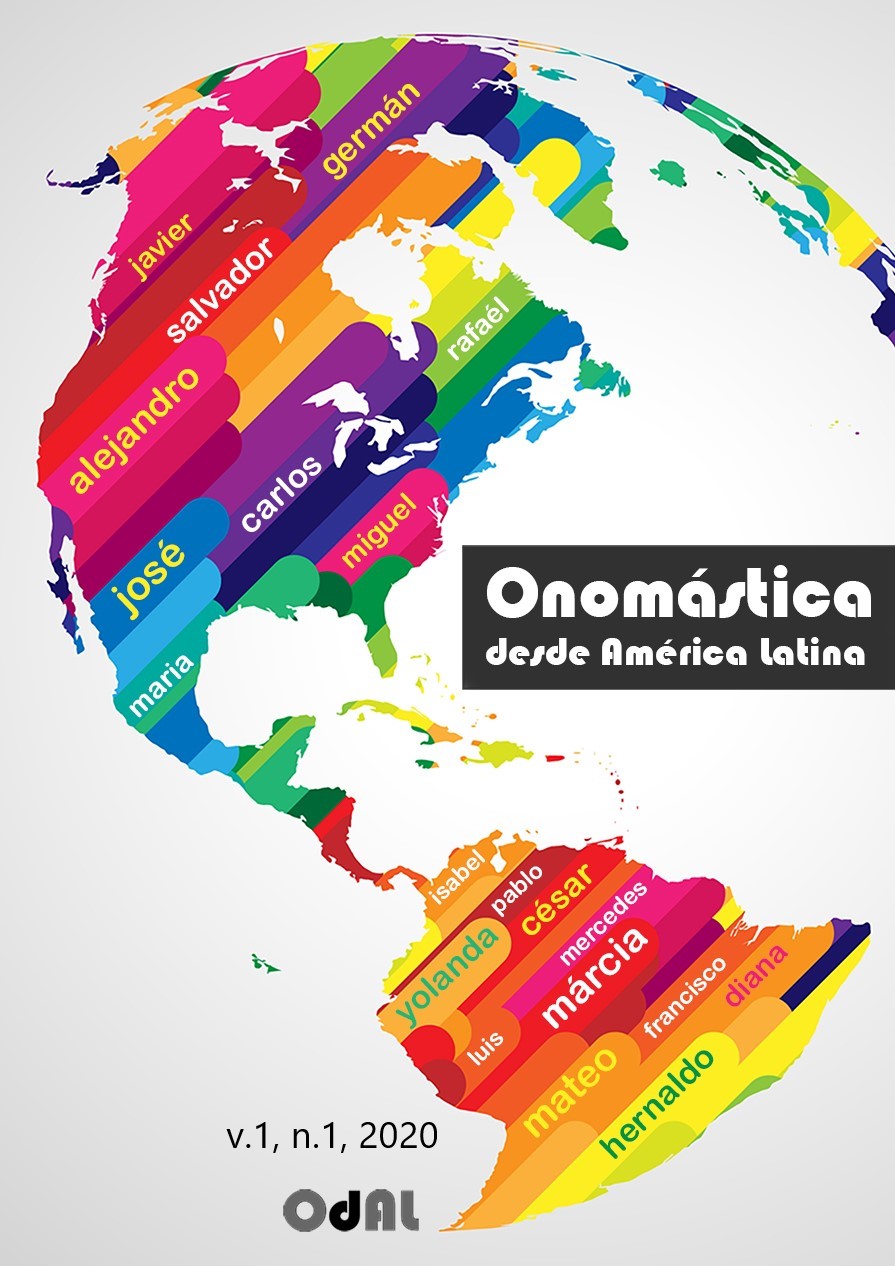Building gender identity from the selection of the first name
DOI:
https://doi.org/10.48075/odal.v1i1.24165Keywords:
Given name, attribution, parental project, gender identityAbstract
This paper reflects on the role given names attribution plays in the construction of gender identity of their bearers. The theoretical framework is based on Marta Lamas Encabo’s work about gender (2000, 2015, 2016), and on socio-anthroponymy research about naming practices and name giving. It is suggested that the selection of given names, as part of the attribution process (Aldrin 2011), contributes to the construction of the bearer’s gender identity by making him/her part of a culture that distinguishes, fundamentally, between the masculine and the feminine.The proposal rests on the symbolic dimension that implies not only the concept of gender as a socio-cultural notion, but that of language as conceptualization and mental categorization of the world. The discussion presented here allows to recognize that the construction of the bearer’s gender identity begins at the very moment in which his/her first name is chosen (which would be a part of the parental project proposed by Jean-Gabriel Offroy 1992). The culturally made distinction between male and female will be created and reproduced socially through the preference for certain given names even though an epicene is chosen.
Key-words: Given name; attribution; parental project; gender identity
References
ALDRIN, Emilia. (2011). Namnval som social handling. Val av förnamn och samtal om förnamn bland föraldrar I Göteborg 2007-2009 (Naming as a social act. Parent’s choices of first names and discussions of first names in Göteborg 2007-2009). Uppsala: Institutionen för nordiska spåk. Nam och samhälle.
ASSMANN, Jan. (2008). “Communicative and cultural memory”, en Astrid Erll, Ansgar Nünning y Sara Young, Cultural Memory Studies. An International and Interdisciplinary Handbook. Berlin, New York: Walter De Gruyter. (Media & Cultural Memory, 8), 109-118.
BARTH, Fredrik. (1976). Los grupos étnicos y sus fronteras: la organización social de las diferencias culturales. México: Fondo de Cultura Económica.
BESNARD, Philippe et Guy Desplanques. (2003). La côte des prénoms en 2004. Paris: Balland.
CAPRINI, Rita. (2001). Nomi Propri. Pisa: Edizioni dell’Orso.
CASTRO ALFÍN, Demetrio. (2014). Antroponimia y sociedad: una aproximación sociohistórica al nombre de persona como fenómeno cultural. Pamplona: Universidad Pública de Navarra.
COULMONT, Baptiste. (2016). Changer de prénom. De l’identité à l’authenticité. Lyon: Presses Universitaires de Lyon.
CUEVAS, Susana. (2016). “La lengua como cultura”, Diplomado en análisis de la cultura. XIX promoción. México: INAH [comunicación personal]
LAMAS ENCABO, Marta. (2000). “Diferencias de sexo, género y diferencia sexual”, en Cuicuilco. México: Escuela Nacional de Antropología e Historia.
----------------------------- (2015). “Usos, dificultades y posibilidades de la categoría género”, en El género. La construcción cultural de la diferencia sexual. Marta Lamas (compiladora). México: UNAM, Centro de investigaciones y Estudios de género.
----------------------------- (2016). “Género y análisis cultural”, Diplomado en análisis de la cultura. XIX promoción. México: INAH [comunicación personal].
LÓPEZ FRANCO, Yolanda G. (2010). Un siglo de nombres de pila en Tlalnepantla de Baz. Estudio lexicológico y sociolingüístico. México: UNAM/Plaza y Valdés. (Lingüística).
MANCILLA GONZÁLEZ, Mario E. (2016). “Cultura, imaginario social e identidad”, Diplomado en análisis de la cultura. XIX promoción. México: INAH [comunicación personal].
MORENO ALMARCEGUI, Antonio y Ana Zabalza Seguín. (1999). El origen histórico de un sistema de heredero único: el prepirineo Navarro, 1540-1739. Madrid : Rialp/ Pamplona : Universidad de Navarra.
OFFROY, Jean-Gabriel. (1992). On nomme un enfant. Choix du prénom et projet parental. Lille: Atelier National de Reproduction des Thèses.
PILCHER, Jane. (2017). Names and “Doing Gender”: How Forenames and Surnames Contribute to Gender Identities, Differences, and Inequalities. [Recuperado de: https://www.ncbi.nlm.nih.gov/pmc/articles/PMC5700988/]
VAN LANGENDONCK, Willy. (2007). Theory and Typology of Proper Names. New York: Mouton de Gruyter.
Downloads
Published
How to Cite
Issue
Section
License
Copyright (c) 2020 Onomástica desde América Latina

This work is licensed under a Creative Commons Attribution-NonCommercial-ShareAlike 4.0 International License.
Creative Commons Copyright Notice
Open Access Journals Policy
Authors who publish in this journal agree to the following terms:
1. Authors retain the copyright and grant the journal the right of first publication, with the work simultaneously licensed under the Creative Commons Attribution License that allows the sharing of the work with recognition of authorship and initial publication in this journal.
2. Mandatory authorities to assume commitments, for non-exclusive distribution of the version of the work published in this journal (eg, publish in an institutional repository or as a book chapter), with recognition of authorship and initial publication in this journal.
3. Authors are allowed and encouraged to publish and distribute their work online (eg in institutional repositories or on the personal page) at any point before or during the editorial process, as this can generate productive changes as well as increase impact and citation of the published work (See The Effect of Open Access).
Creative Commons License
This work is licensed under a Creative Commons Attribution-NonCommercial-ShareAlike 4.0 International License, which allows sharing, copying, distributing, displaying, reproducing, a whole or parts as long as it has no commercial purpose and is cited by authors and a source.

